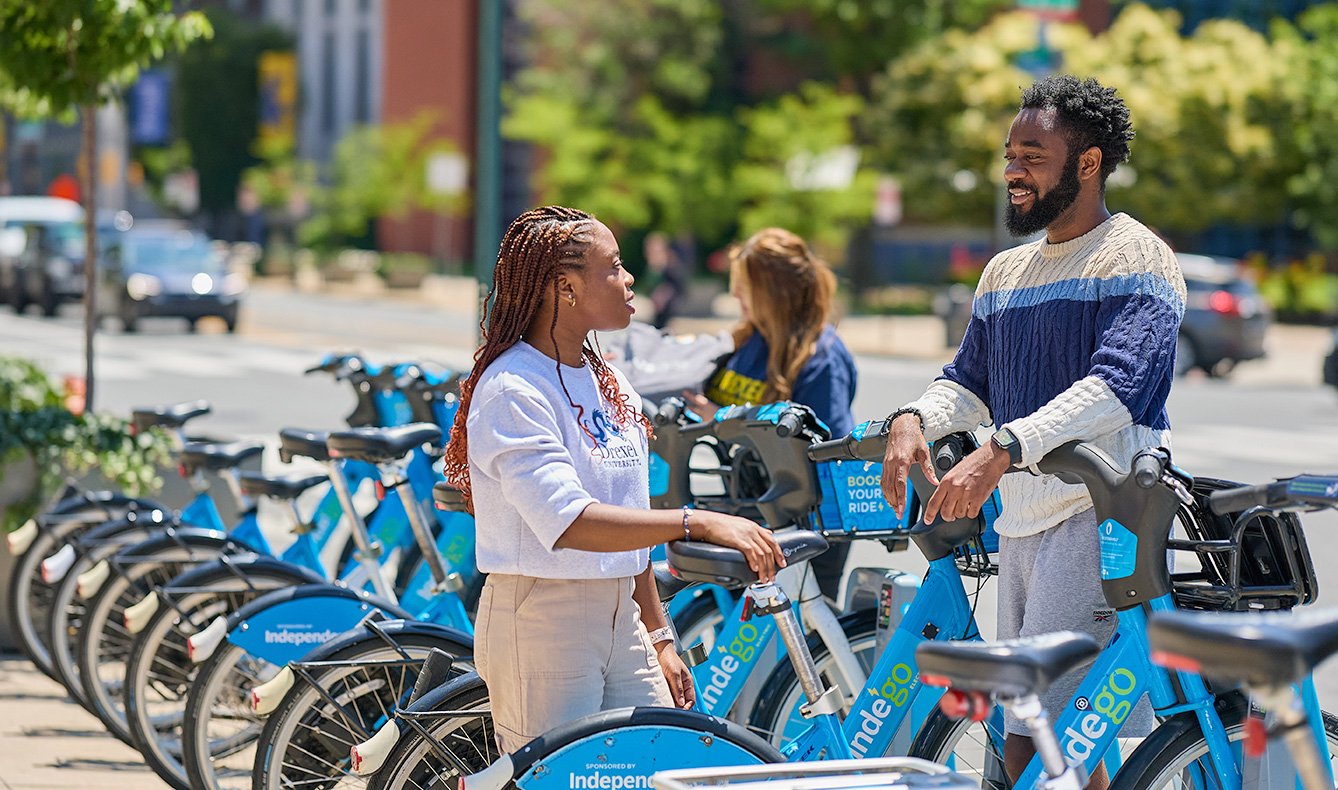


Requirements
and Restrictions
Learning Work?
or Live Event

Online Master of Public Health in Urban Health
Classes Begin: June 22, 20261-3 years
Fully Online
56
No GRE or on-campus requirements
Urban Studies and Public Health Online Master Degree
Drexel University Dornsife School of Public Health’s asynchronous, online MPH in Urban Health trains you in the foundational principles of urban health practice. Rooted in the concept of health as a human right, this program will teach you to develop culturally competent programs, policies, and solutions to contemporary urban health challenges, including built environment, healthy housing, and ecological concerns.
Program Features
- 56 quarter credits
- This program can be completed 100% online and has no residency component
- Along with a focus on urban health, you can delve deeper into topics like maternal child health, health disparities, LGBT health, or infection prevention and control
- Learn from well-respected Drexel Dornsife faculty who are experts in the field of urban health
- Drexel Dornsife is proud to be the first school in Philadelphia to earn CEPH accreditation
- U.S. News & World Report ranks Drexel Dornsife the #1 graduate school of public health in Philadelphia and a top school nationwide.
- No GRE required
MPH Experiential Learning Opportunities
Applied Practical Experience
Drexel Dornsife believes in providing real-world practical knowledge and skills as a part of your education. This requires creating opportunities to build in-depth understanding and a diverse breadth of knowledge that you can immediately apply in your career. You will be required to complete the Applied Practical Experience (APE) and breadth activities. The APE is a hands-on practical experience you receive through either a project with your current employer, an outside organization, or in an online course-based setting. The experiences can be completed remotely or near your home, which means you never have to come to campus. Drexel Dornsife will even assist you in making connections for these opportunities with public health organizations and beyond.
Through the program, you can pursue the APE and breadth activities in urban and global settings, working with Drexel’s partners around the globe or seeking out opportunities in the U.S. with diverse communities.
Integrative Learning Experience
As an MPH student nearing program completion, you’ll be required to enroll in the integrative learning experience (ILE). With a goal of illustrating mastery of core public health and focus-area-specific competencies, the ILE is completed in the final year of the program and includes writing a high-quality paper. The ILE for the Urban Health MPH is a capstone course.
What is Urban Public Health?
Dornsife's Urban Health Collaborative defines "urban" as "the geographies where people’s homes, workplaces and gathering spaces are concentrated."
While cities are prominent in discussions of urban health, the definition of urban areas is often inclusive of areas surrounding cities as contexts for the diverse sectors of daily life.
By 2050, more than 65 percent of the world’s population will live in cities. This shift in demographics means that cities not only present complex, large-scale health challenges, they also offer one-of-a-kind opportunities to translate public health solutions to communities of all sizes.
What Do You Learn in Urban Healthcare Studies?
MPH in Urban Health Overview
In Drexel Dornsife’s online MPH in Urban Health, you will learn to:
- Apply theories and frameworks from urban social sciences to identify social and other determinants of health, and develop solutions to major urban health problems
- Critique policies and programs that promote the health of urban populations
- Engage various constituencies including policymakers, community residents and leaders, civil society organizations, social movements, and public agencies in identifying and reducing health problems facing cities
- Identify ecological models to identify appropriate solutions to the health problems of cities at the individual, family, community, municipal, regional, national, and global levels
- Select appropriate epidemiological methods to characterize patterns of health and disease
What Can You Do With a Degree in Urban Health?
A degree in urban health prepares you for careers in areas like health education and community health, as well as provide opportunities to collaborate in urban and regional planning. Health educators and community health workers promote wellness in their communities through teaching populations healthy behaviors. They may also collect data and work with communities to understand health concerns that affect specific populations.
Public health practitioners also collaborate with urban and regional planners to assess, implement, and evaluate strategies of health in all policies, such as healthy housing and neighborhoods, safe and active transportation, and issues of sanitation and air quality.
MPH Urban Health Career Opportunities
The job outlook in these areas is encouraging. As a graduate of Drexel’s MPH in Urban Health, you can expect to look for career opportunities in organizations like:
- Public health agencies in cities and/or states
- Non-profits/philanthropies/NGOs (domestic or global)
- National government organizations (e.g., CDC, NIH)
- Private companies focused on urban health issues (e.g., insurance companies, hospitals, etc.)
- Research organizations (e.g., universities, institutes, centers, hospitals, etc.)
- Doctoral programs in public health, sociology, medicine, public policy, law, sociology, and anthropology
Learn more about the public health industry.
How Much Can You Make with a Master’s in Urban Health?
MPH Urban Health Salary Expectations
Your salary as an urban health professional will vary based on your title, location and years of experience. Learn more about public health salaries.
How Long Does it Take to Complete a Master’s in Urban Health?
Drexel University’s online MPH in Urban Health offers multiple tracks that make earning your degree convenient for your schedule:
- 12 Months
This plan allows you to complete the program in the shortest amount of time. It’s recommended that you not work while pursuing this plan.
Expect to spend: 60-80 hours of coursework each week- This option begins in the summer term. When applying, please make sure to select the 12 month option and summer term option under the term you plan to enroll question.
- 18 Months
This plan allows you to complete the program by March of your second year. You may be eligible for a research assistantship. You will also have the time to do an internship over the summer should you choose.
Expect to spend: 40-60 hours of coursework each week - 21 Months
This plan allows you to complete the program in less than 2 years, but still work if you choose. You may be eligible for a research assistantship. You will have the time to do an internship over the summer should you choose.
Expect to spend: 30-50 hours of coursework each week - 33 Months
This plan allows you to finish the program in less than 3 years while still working full-time. You may be eligible for a research assistantship. You will also have time to do an internship over the summer if you so choose.
Expect to spend: 18-20 hours a week. - Flexible Plan of Study
We understand that sometimes you need to go at your own pace. Working closely with your program manager, you can create a customized plan of study that works best for you. On the application, please select the 33-month option. Then set up time to meet with your program manager prior to registering for your first class to discuss your options further.
Frequently Asked Questions
Is the Online MPH in Urban Health Program Asynchronous?
Online MPH in Urban Health classes are conducted asynchronously, which means you are not required to be online at a specific time for course instruction. However, many of our classes include group work. In these instances, you will be asked to find time to meet online with other students to complete the small group projects.
Drexel's 10,000 Hours Podcast: Sharrelle Barber
How can where you live affect your health? For Black communities, their neighborhoods can literally make them sicker. Sharrelle Barber, an assistant research professor at Drexel, looks at the intersection of place, racism, and health.
Related Programs
- Executive MPH
- MPH: Epidemiology
- MPH: Global Health
- Certificate in LGBT Health
- Certificate in Maternal and Child Health
- Certificate in Public Health
- Certificate in Urban Health
- Certificate in Infectious Disease Prevention and Control
- On-Campus Public Health Programs
Drexel University offers a variety of Graduate Minors that can be added to any master's degree program.
State restrictions may apply to some programs.
Curriculum
This program is organized into four 10-week quarters per year (as opposed to the traditional two semester system) which means you can take more courses in a shorter time period.
| Core Courses | ||
| BST 571 | Introduction to Biostatistics | 3.0 |
| EPI 570 | Introduction to Epidemiology | 3.0 |
| HMP 505 | Qualitative Data and Mixed Methods Analysis | 3.0 |
| PBHL 510 | Public Health Foundations and Systems I | 4.0 |
| PBLH 511 | Public Health Foundations and Systems II | 4.0 |
| Major Courses | ||
| CHP 673 | Process Monitoring and Outcomes Evaluation for Community Health Programs | 3.0 |
| EOH 642 | Healthy Housing & Built Environment | 3.0 |
| EOH 550 | Introduction to Urban Health | 3.0 |
| EPI 563 | Interprofessional Collaboration for Urban Health | 3.0 |
| EPI 633 | Urban Inequality and Health: Theory, Evidence, and Action | 3.0 |
| Electives | 21.0 | |
| Integrative Learning Experience Capstone | ||
| EOH 752 | Urban Health Integrative Learning Experience Capstone | 3.0 |
| Applied Practical Experience | ||
| PBHL 500 | Practical Experience for the Master of Public Health | 0.0 |
| Total Credits | 56.0 | |
Admissions Criteria
- Bachelor's degree from a regionally accredited college or university, or an equivalent international institution
- GPA of at least 3.0 preferred
- Those with a lower GPA are encouraged to apply, and should highlight the following in their personal statement: relevant work experience, professional certifications, and/or continuing education that demonstrates academic excellence
- Standardized Test Scores are NOT required
- However, you may choose to submit scores to strengthen your application
Required Documents
With multiple ways to submit documents, Drexel makes it easy to complete your application. Learn more by visiting our supporting document submission guide.
- A completed application
- Official transcripts from all universities or colleges and other post-secondary educational institutions (including trade schools) attended
- Two professional letters of recommendation
- Resume
- Essay of approximately 500 words discussing your interest in public health, current career goals, and why you are interested in Drexel University.
- Additional requirements for International Students
Transfer Credit Opportunities
If you're considering transferring into this online program, you may be eligible to transfer up to 15 graduate-level quarter credits. Learn more about Drexel Dornsife’s transfer requirements and guidelines.
Computer Requirements
Working knowledge of and access to a personal computer (no more than 4 years old), high-speed connection to the Internet, and Microsoft Office applications.
Tuition
The tuition rate for the academic year 2025-2026 is $1062 per credit. (A 25% tuition savings off Drexel's regular tuition rate of $1416 per credit)
For the academic year 2025-2026, students enrolled in an online graduate academic program will be charged a graduate online program fee of $125 per year.
- This program is eligible for Financial Aid.
- Special tuition rates available for Drexel University Alumni, Military members, and members of our Partner Organizations
- These rates apply only to new online students and students being readmitted.
- Tuition rates are subject to increase with the start of each academic year in the fall term.
- All students must contact applyDUonline@drexel.edu within the first two weeks of the term to request tuition savings for which they qualify.
- Special rates cannot be combined. If you qualify for more than one special rate, you'll be given the one with the largest savings.
- When receiving special tuition plans, you may not be able to combine them with other tuition benefits that may be available from Drexel University.
Academic Calendar
2025-2026 Academic Year
Term
Classes Begin
Classes End
Exams Begin
Exams End
Fall 2025
September 22, 2025
December 6, 2025
December 8, 2025
December 13, 2025
Winter 2026
January 5, 2026
March 14, 2026
March 16, 2026
March 21, 2026
Spring 2026
March 30, 2026
June 6, 2026
June 8, 2026
June 13, 2026
Summer 2026
June 22, 2026
August 29, 2026
August 31, 2026
September 5, 2026


© All Rights Reserved

